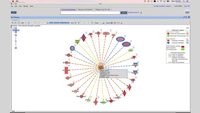QIAGEN IPA
IPA deeper dive: Making most out of user’s core/expression analysis
308 views
An Ingenuity Pathway Analysis (IPA) deeper dive into the core analysis (also known as expression analysis) training was requested by IPA users. Core/Expression analysis is performed on RNA-seq, scRNA-seq, proteomics and many other types of ‘omics data). Accordingly, this training will focus on these topics and more:
· What are the different result types of results produced by an IPA core analysis?
· How can we identify key regulators and relevant regulatory networks?
· What are the biomarkers and genes associated with diseases and biological processes of interest?
· Can IPA help me generate novel directional (regulator effect) and non-directional (interaction) networks from user’s dataset?
· Another topic per registrant request
· What are the different result types of results produced by an IPA core analysis?
· How can we identify key regulators and relevant regulatory networks?
· What are the biomarkers and genes associated with diseases and biological processes of interest?
· Can IPA help me generate novel directional (regulator effect) and non-directional (interaction) networks from user’s dataset?
· Another topic per registrant request
If you haven’t done a core/expression analysis in IPA before, we recommend you review the below slides before (or after) this training. It’s not a requirement for following this training but it will help.
Related videos
QIAGEN IPA
Analyze, compare and contextualize your biological data with QIAGEN IPA
Discover why QIAGEN Ingenuity Pathway Analysis (IPA) is more than just...
QIAGEN IPA
Interpreting your comparison analyses results in IPA
Learn how to view and interpret your comparison analyses results in IPA and...
QIAGEN IPA
New user training: QIAGEN Ingenuity Pathway Analysis (IPA)
New user training: Large dataset analysis and knowledge base queries using...
QIAGEN IPA
Interpreting the Results of Your Phosphoproteomics Analysis in IPA
Learn how to view and interpret your Phosphoproteomics Analysis results in...



